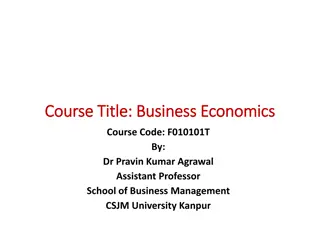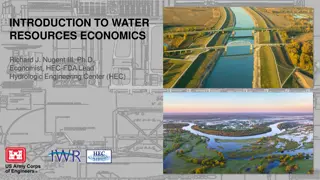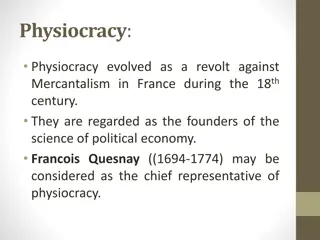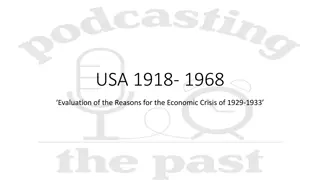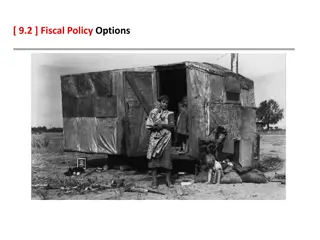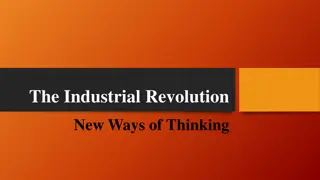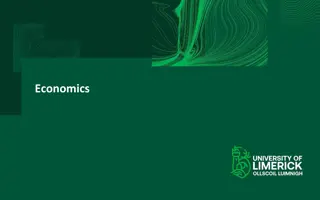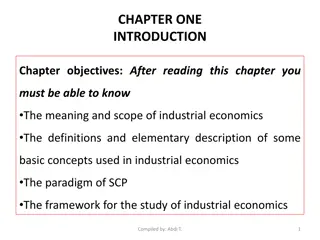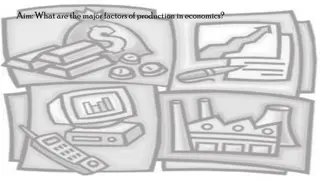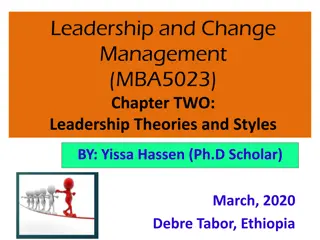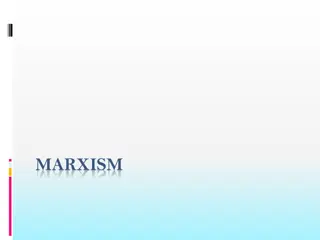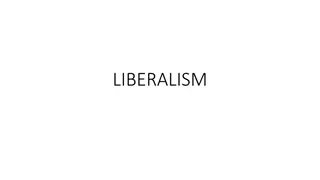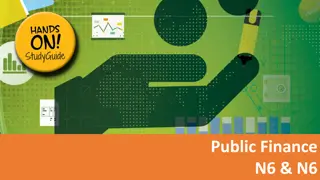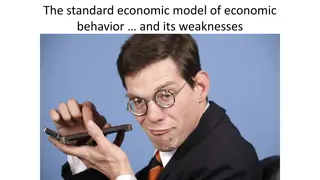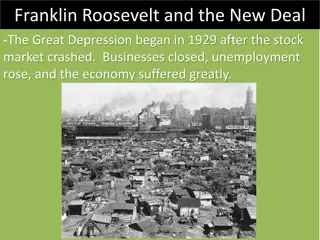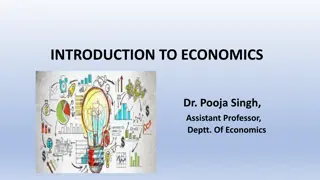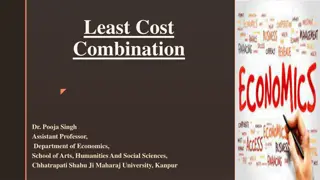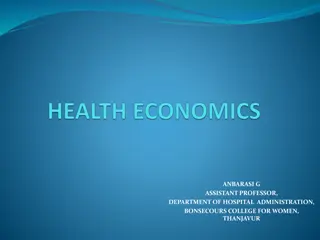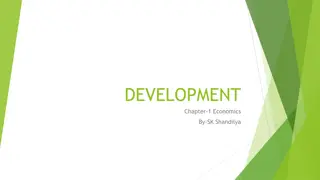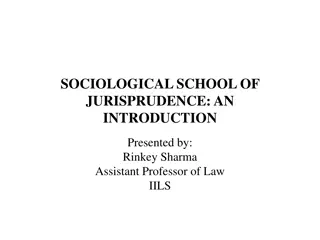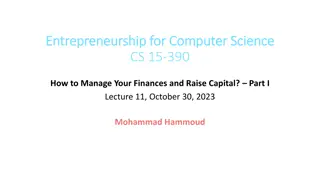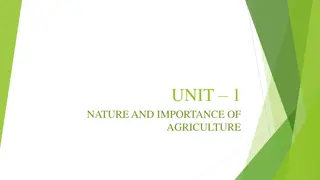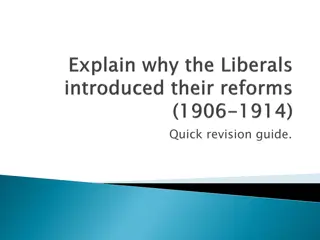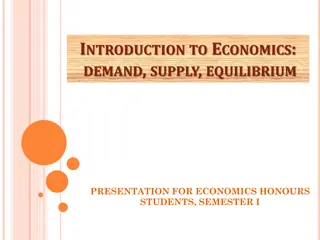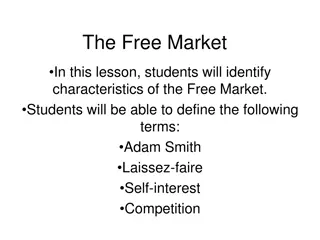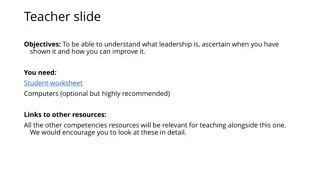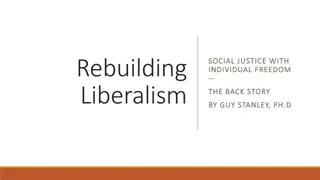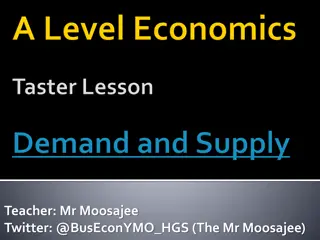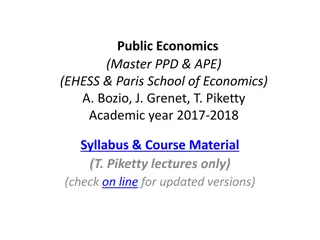Understanding Laissez Faire Teaching Styles
Laissez-faire teaching allows students to work independently without excessive oversight. This method emphasizes student autonomy and individualized instruction. The teacher's role is hands-off, promoting student self-reliance. This approach benefits self-motivated and capable learners.
3 views • 11 slides
Understanding Business Economics: Course Overview and Resources
Explore the course on Business Economics covering topics like demand analysis, production, pricing, and profit management. Delve into the field with suggested readings and definitions of business and economics. Gain insights into managerial decision-making in the realm of scarce resources and societ
2 views • 45 slides
Understanding Water Resources Economics
This resource introduces the principles of water resources economics, focusing on decision-making, cost-benefit analysis, and the role of economics in flood risk management and national development. It discusses how economics influences individual and government decisions in managing limited resourc
3 views • 14 slides
Introduction to Experimental Economics by John Hey: A Comprehensive Overview
Explore the interconnected realms of Experimental Economics and Behavioral Economics through the insightful lectures of John Hey, an Emeritus Professor at the University of York. Discover the methodology of testing economic theories for validity and the practical applications of experimental economi
1 views • 58 slides
Understanding Macro Economics: Importance and Significance
Macro economics, a vital field originating with the Mercantilists and further developed by J.M. Keynes, focuses on studying the economy as a whole. It encompasses aggregates like national income, employment, output, and investment, providing insights into economic fluctuations, unemployment, inflati
1 views • 6 slides
Understanding Water Resources Economics and Public Policy
Explore the foundations of water resources economics through topics such as decision-making, public economics perspectives, flood control acts, cost-benefit analysis, and optimization. Gain insights into how economics influences individual, household, organizational, and governmental decision-making
4 views • 15 slides
Explore Economics as a Leaving Certificate Subject
Economics as a Leaving Certificate subject prepares students for diverse career paths in business, finance, and management. The course includes a research project and a structured exam format. With a focus on theory, practical application, and real-world economic concepts, Economics equips students
5 views • 11 slides
Understanding Physiocracy: The Economic Philosophy of Francois Quesnay
Physiocracy emerged as a response to Mercantilism in 18th century France, with Francois Quesnay as a key figure. The basic principles of Physiocracy include the belief in natural order, advocacy of laissez-faire, emphasis on agriculture as the only productive occupation, support for private property
4 views • 14 slides
Elevate Your Scores Master the IB Economics (SL and HL) Examination
Unlock your potential and excel in the IB Economics (SL and HL) Examination with our comprehensive study resources. Access practice exams, study guides, and expert tips to boost your scores. Start your journey towards academic success now!\nClick Here to Get IB-Economics Dumps With 16 USD Discount C
0 views • 7 slides
Evaluation of Economic Crisis Causes in 1929-1933: Republican Policies and Factors
The economic crisis of 1929-1933 in the USA was influenced by various factors, including Republican government policies favoring laissez-faire capitalism, overproduction of goods, weaknesses in the banking system, international economic issues, and the Wall Street Crash. The prosperity of the 1920s,
0 views • 33 slides
Understanding the Positive/Normative Distinction in Economics
Textbooks in economics often teach the Positive/Normative Distinction, where Positive Economics deals with facts and Normative Economics focuses on values and opinions. This distinction is a point of debate among scholars, with some arguing that values are intrinsic to all analysis. The debate also
0 views • 28 slides
Understanding Fiscal Policy Options in Economics
Explore the evolution of economic theories including classical economics, demand-side economics, and supply-side economics. Learn about the impact of key figures like John Maynard Keynes and Milton Friedman on fiscal policy decisions and the U.S. economy. Delve into the strategies employed during th
0 views • 18 slides
The Industrial Revolution and Laissez-Faire Economics: Perspectives on Population and Poverty
Industrial revolution led to new ways of thinking, including population theories by Thomas Malthus and economic concepts like laissez-faire advocated by thinkers such as Adam Smith and David Ricardo. Malthus and Ricardo held bleak views on poverty and population growth, suggesting limited government
1 views • 17 slides
Exploring Economics: Why Study, Skills Acquired, and Module Overview
Dive into the world of economics to understand why studying it is important and what skills you can develop. Explore modules covering microeconomics, macroeconomics, quantitative methods, international economics, and more, preparing you for a career in economic analysis and decision-making within th
0 views • 4 slides
Overview of Industrial Economics: Scope, Evolution, and Challenges
Industrial economics delves into economic issues of firms and industries, exploring their interactions with society. This chapter discusses the meaning and scope of industrial economics, its historical evolution from classical to contemporary theories, traditional concerns like firm performance and
0 views • 71 slides
Understanding the Major Factors of Production in Economics
Factors of production in economics encompass land, labor, capital, and entrepreneurship. Land represents natural resources, labor involves human effort, capital includes tools and machinery, and entrepreneurs drive innovation and risk-taking. These factors are essential for producing goods and servi
0 views • 10 slides
Understanding Financial Economics and Its Importance in Markets
Financial economics is a branch of economics focused on the distribution of resources in uncertain markets. It involves making decisions considering future events and creating models to analyze variables affecting decisions. Key aspects include working out portfolio risks and utilizing financial ins
0 views • 129 slides
Leadership Styles and Theories: An Overview
Explore the concept of leadership styles and theories, focusing on the different types of leadership styles such as autocratic, democratic, and laissez-faire. Learn about the components of a manager's leadership style, including motivation approaches, decision-making styles, and areas of emphasis in
4 views • 24 slides
Understanding Marxism and Capitalism
Marxism is a body of social, political, and economic thought derived from the works of Karl Marx and Friedrich Engels, focusing on the analysis of capitalism. Capitalism is an economic system where private individuals own goods and services based on market supply and demand. The purest form of capit
0 views • 25 slides
Understanding Liberalism: Key Ideas and Historical Context
Liberalism, a prominent political ideology, emerged in the 19th century and is closely linked to capitalism. It stands against absolutism and feudal privileges, advocating for individualism, freedom, reason, equality, toleration, consent, and constitutionalism. The evolution of liberalism emphasized
1 views • 18 slides
Understanding Fundamental Principles of Public Finance
Public Financial Management involves the management of public funds, focusing on goals, objectives, and ideologies shaping government functions. Concepts such as laissez-faire and socialism influence how governments provide services, enforce laws, protect private interests, and promote social welfar
0 views • 86 slides
The Standard Economic Model and Behavioral Economics
The standard economic model, rooted in neo-classical economics, assumes rational behavior with full information and known preferences. In contrast, Behavioral Economics integrates insights from psychology to provide a more nuanced understanding of consumer behavior.
0 views • 30 slides
Franklin D. Roosevelt and the New Deal During the Great Depression
The Great Depression of 1929 led to high unemployment, closed businesses, and economic suffering. President Hoover's laissez-faire policies failed to address the crisis adequately. In the 1932 election, FDR introduced the New Deal with a focus on Relief, Recovery, and Reform to combat the Depression
2 views • 13 slides
Understanding Economics: Concepts and Principles Explained
Economics, derived from the Greek word Oikonomia, focuses on managing resources to achieve maximum output and satisfaction. It encompasses the study of wealth, choice-making, and dynamic growth. The discipline emphasizes the role of factors of production - land, labor, and capital - in generating in
2 views • 15 slides
Principles of Least Cost Combination in Economics
In economics, the principle of least cost combination involves determining the optimal combination of factors of production (such as capital and labor) that allows a firm to achieve maximum output at minimum cost. This is achieved by identifying the point where the isoquant curve intersects the isoc
1 views • 4 slides
Overview of Health Economics: Key Concepts and Principles
Health economics is a vital field that explores the relationship between economics and healthcare, focusing on efficiency, value, and behavior in health production and consumption. It encompasses topics like determinants of health, demand and supply of healthcare, health sector budgeting, and equity
1 views • 12 slides
Overview of Development Economics and Goals
Development economics is a branch of economics that focuses on improving the economies of developing countries by targeting factors such as health, education, working conditions, and policies. It involves macroeconomic and microeconomic analysis to enhance domestic and international growth. Differen
1 views • 11 slides
Qualities of a Successful Economics Teacher
The role of an economics teacher is crucial in shaping students' understanding and knowledge. The qualities of an effective economics teacher include expertise in economics, mastery of teaching methodologies, use of innovative teaching techniques, and a commitment to ongoing professional development
1 views • 6 slides
Sociological School of Jurisprudence: An Introduction
Sociology studies human relations within society while jurisprudence focuses on law. The Sociological School of Jurisprudence emphasizes the interconnection between law and society. It emerged in response to the doctrine of Laissez Faire during the Industrial Revolution, advocating for a balance bet
1 views • 6 slides
Financial Intelligence and Capital Management in Entrepreneurship for Computer Science
Understanding financial intelligence is crucial for success in business. Entrepreneurs must grasp unit economics, interpret financial statements, and raise capital effectively. Unit economics is key to determining if a venture is sustainable, where the Lifetime Value of an Acquired Customer must exc
3 views • 27 slides
Understanding the Significance of Agriculture Economics in India
Agriculture plays a crucial role in the Indian economy, contributing significantly to GDP and rural livelihoods. Agriculture Economics involves the study of resource allocation in the production, distribution, and consumption of agricultural goods. This branch of economics blends principles from gen
0 views • 24 slides
Welfare Reforms in the 19th Century: A Historical Overview
In the 19th century, poverty was often blamed on individuals, leading to a laissez-faire approach by the government. Key figures like Charles Booth and Seebohm Rowntree conducted insightful studies on poverty, highlighting the need for welfare reforms. The emergence of genuine concern for the poor a
0 views • 8 slides
The Roaring Twenties: Politics and Social Issues in 1920s America
The 1920s in America marked a period of significant political and social change. The nation saw a return to conservatism and isolationism after World War I, with the Republican Party in control. Nativism was on the rise, leading to restrictive immigration laws and controversial events like the Sacco
0 views • 22 slides
Understanding Economics: Demand, Supply, and Equilibrium
Explore the fundamental concepts of economics, including the nature and scope of economics, demand, and its determinants. Learn about normative and positive economics, microeconomics, macroeconomics, and the factors affecting demand such as income, price of the good, and complementary goods. Gain in
0 views • 19 slides
Understanding the Free Market Economy
Students will learn about the characteristics of the Free Market, defining terms like Adam Smith, Laissez-faire, self-interest, and competition. The lesson explores how markets function, the concept of laissez-faire, and Adam Smith's idea of the Invisible Hand in the economy.
0 views • 15 slides
Understanding Leadership Competencies: Types of Leaders and Activities
Explore the concept of leadership, identifying different types of leaders - Laissez-Faire, Autocratic, Democratic, and Paternalistic. Learn about their characteristics and how they handle various situations. Engage in group discussions and activities to practice different leadership styles, enhancin
0 views • 13 slides
Italian Emigration: A Historiographical Analysis, 1860-1960
Italian emigration between 1860 and 1960 saw significant numbers of Italians leaving the country for various destinations, particularly the Americas. The emigration trend reflected the failures of the Liberal state and highlighted issues with the laissez-faire approach, leading to challenges in addr
0 views • 39 slides
Rebuilding Liberalism: Social Justice with Individual Freedom
The book "Rebuilding Liberalism" by Guy Stanley, Ph.D., challenges neo-liberalism's laissez-faire approach and emphasizes the importance of civil society in achieving social justice and individual freedom. It outlines how the state influences markets, money, and law, and highlights the need for demo
0 views • 20 slides
Understanding Economics: Explore the World of Scarce Resources, Prices, Government Policies, and Global Impacts
Delve into the intriguing realm of economics with Mr. Moosajee at HGS! Unravel the mysteries behind how scarce resources are allocated, why prices fluctuate, the impact of government policies, concerns about inflation, strategies for reducing unemployment, and more. Discover the relevance of economi
0 views • 20 slides
Public Economics Course Summary - EHESS & Paris School of Economics
The Public Economics course at EHESS & Paris School of Economics offers an introduction to taxation history, government intervention theories, and policy incidence across developed and developing countries. The syllabus covers topics like welfare analysis, wealth taxation, and optimal taxation strat
0 views • 11 slides

